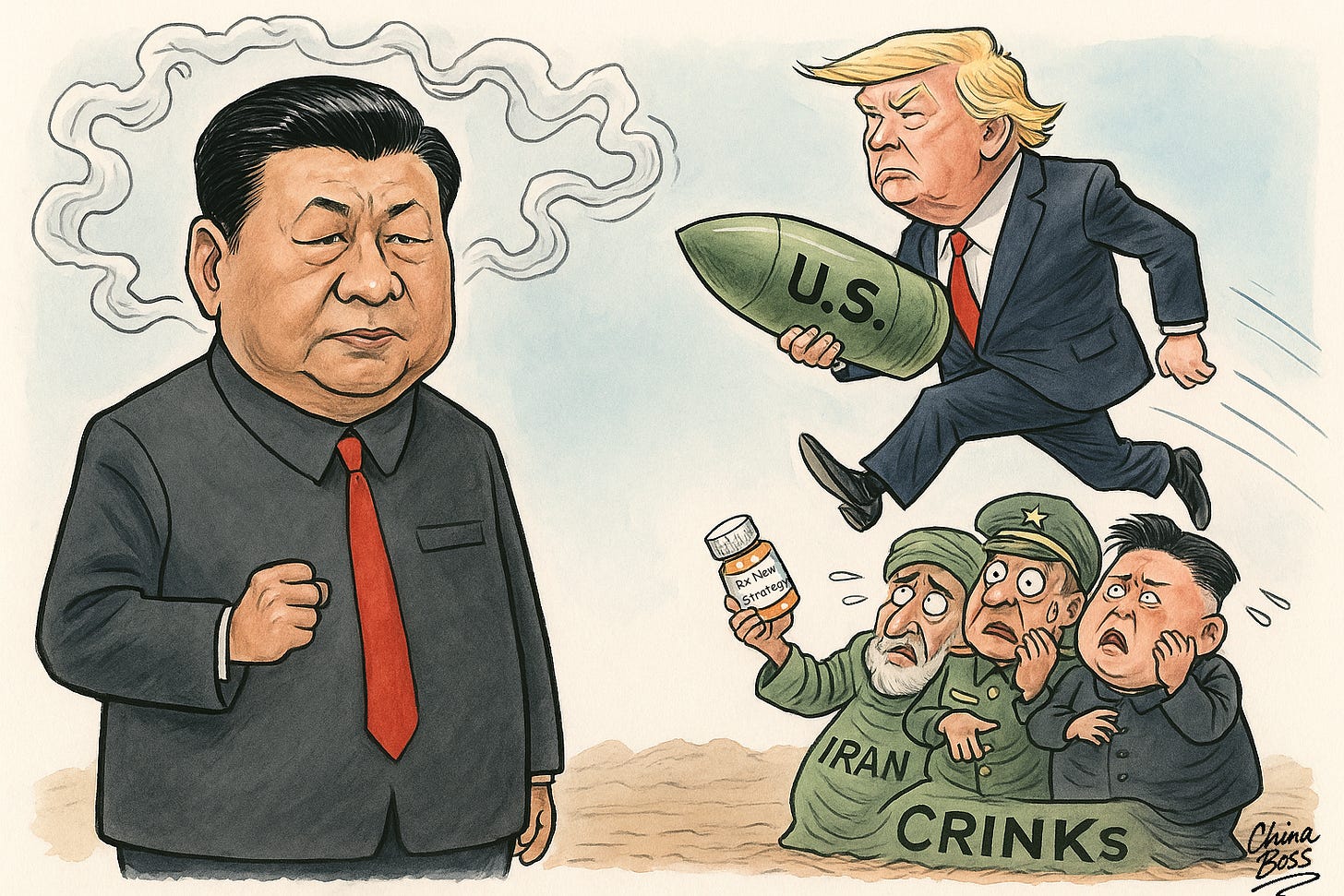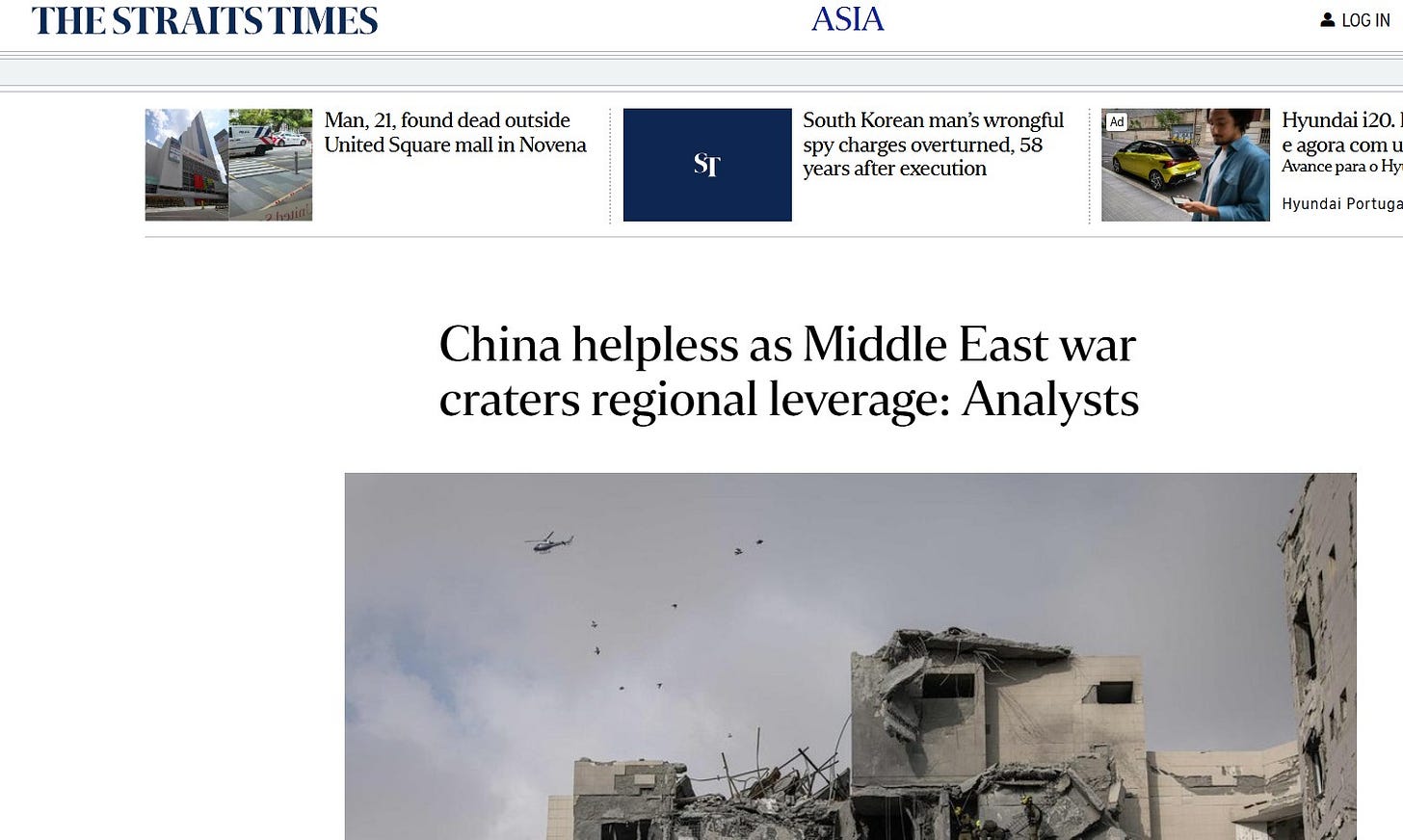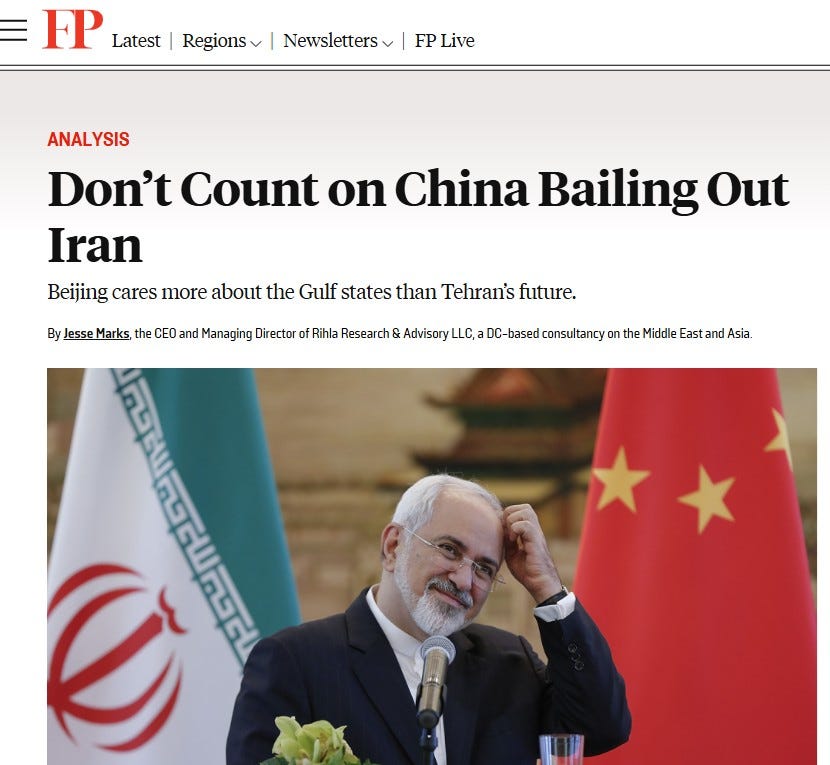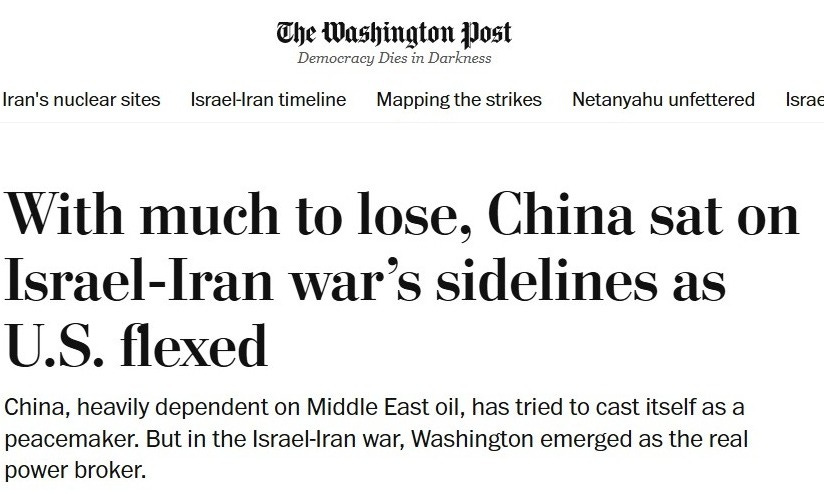When missiles flew, China flinched, Plus EU loosens subsidy rules to stop factory flight to US, China-- China Boss News 6.27.25
Newsletter
What happened?
The piercing of China’s Middle Eastern veil came with a jolt.
Iran fired missiles through Qatari airspace at U.S. forces in the Gulf—retaliation for Trump’s decision to, in his words (and seemingly no one else’s), “obliterate” Tehran’s nuclear sites.
But what erupted was not just the worst escalation in the region in a generation—it was a strategic reckoning for China, and an opening for Washington to seize the initiative.
Oil markets spiked. Maritime insurers froze coverage for vessels in and out of the Strait of Hormuz.
And Beijing, long accustomed to managing Gulf crises from a comfortable remove, found itself thrust into the center of a storm it could neither defuse nor dictate.
Hours later, Donald Trump tossed gasoline on the fire.
The U.S. president publicly hinted that China could resume buying Iranian oil—despite U.S. sanctions.
Then he reversed course, urging Beijing to purchase American crude instead.
Why it matters.
Losing face in the Gulf
For years, Beijing has cast itself as the Middle East’s 21st century alternative: a neutral broker, a builder of infrastructure, a quiet superpower untainted by war.
But when the missiles fell, that fountainhead of China’s propaganda prowess suddenly evaporated like a desert mirage.
China condemned U.S. “destabilization” and issued vague calls for restraint.
But it stopped short of backing Iran, avoided mentioning Israel, and remained eerily unassertive at the United Nations.
In short, Xi’s government didn’t lead—it evacuated. Within days, Chinese nationals were pulled from both Israel and Iran.
For a nation so exposed to Gulf energy flows, Beijing’s retreat spoke volumes.
The Strait of Hormuz funnels nearly a quarter of that oil. Despite Beijing’s push into green tech and Central Asian pipelines, it remains dangerously reliant on fossil fuels shipped through a single maritime corridor—consuming more oil than any country except the United States.
That’s why Beijing has little doubt that a single naval skirmish, pipeline sabotage, or port closure would send shockwaves through its economy.
Yet backing Tehran militarily could rupture China’s trade with Europe, trigger fresh U.S. sanctions, and sink already fragile markets.
So, Xi took shelter in quiet caution—a cloak that, under the glare of global headlines, looked more like paralysis than a plan. ⬇️
So much for the age of multipolarity. 🤷♀️
The 2023 Iran–Saudi deal once crowned China a peacemaker and gave Iran greater strategic weight within the CRINK equation.
But as fire rained on Tehran, Beijing offered neither shield nor solution.
Its “stabilizer” story went to ground—muted and buried alongside Iran’s Supreme Leader in an undisclosed bunker.
Who will lead the new world order now?
As the world watched Donald Trump emerge from the NATO summit basking in the glow of a fragile Middle East ceasefire and transatlantic muscle-flexing, a quieter—but no less revealing—moment unfolded half a world away.
In Qingdao, China’s defense chief hosted his Russian and Iranian counterparts under the Shanghai Cooperation Organisation banner.
But instead of projecting unity, the summit exposed cracks—and a harsher truth: the so-called CRINK axis (China, Russia, Iran, North Korea) is far less formidable than it appears.
Trump’s decision to bomb Iranian nuclear sites unsettled allies and adversaries alike.
But in Beijing and Moscow, it triggered deeper anxieties. If the U.S. can act this decisively in the Gulf, what might it do in Ukraine—or over Taiwan?
The strike undercut Trump’s “America First” brand and reignited debate over U.S. credibility abroad.
But it also sent a clear message: when it comes to high-risk, high-stakes use of force, only Washington is still willing—and able—to lead.
The CRINKs, for all their posturing, stayed on the sidelines. And China’s moment to stiffen the axis came and went—without even a hint of performative rage.
Beijing’s response was swift but shallow: diplomatic murmurs with no muscle behind them.
When it really mattered, China was nowhere to be found—not even on the battlefield the CRINKs increasingly claim as their own: sharp power.
That absence set the tone, as Trump’s strikes thundered throughTehran’s nuclear program.
But framing Trump’s strike as merely a nuclear issue misses the broader geopolitical picture.
Former Australian official John Lee put it bluntly in The Australian Financial Review: the strike was “important for re-establishing the principle of deterrence.”
Where Barack Obama drew red lines in Syria and failed to act, Trump—the “no new foreign wars” president—drew blood.
It’s an important contrast.
Because if adversaries believe the U.S. won’t act, even the most powerful military becomes irrelevant. And Trump—fully aware of the “TACO” tag (Trump Always Chickens Out)—likely understood that failing to strike would only cement it.
Iran isn’t China. But the signal wasn’t lost on Xi Jinping.
While Tehran is weaker and more isolated, Lee argued that Trump’s show of force complicates Beijing’s risk calculus—especially when it comes to Taiwan.
“China constantly assesses whether the U.S. is willing to accept risk and use force,” he said. “Trump’s strike makes that question harder to answer.”
Trump may have campaigned on avoiding foreign wars. But in striking Iran, he reset the geopolitical mood lighting.
The myth of American isolationism is gone. The illusion of Chinese influence, exposed. And the CRINKs look rattled, outmaneuvered, and in need of a strategy—if not a sedative.
More troubling for Xi: the Iran episode reminds the myriad of smaller states he counts as his—those dotting the Belt and Road, seeking entry into BRICS, and backing Beijing at the UN—that only one power still moves with unchallenged force between heaven and earth.
And it isn’t the Middle Kingdom.
This Week's China News
The Big Story in China Business
EU LOOSENS SUBSIDY RULES TO STOP FACTORY FLIGHT TO US, CHINA: For decades, the European Union treated energy subsidies as a red line. Covering a company’s electricity bills, officials warned, would distort competition and unravel the single market.
This week, Brussels crossed that line.
Keep reading with a 7-day free trial
Subscribe to China Boss News to keep reading this post and get 7 days of free access to the full post archives.









